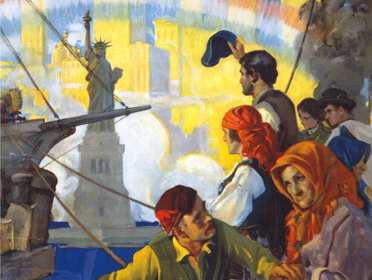Causes of World War 1

Table of Contents
- War Guilt Clause
- Assassination of Franz Ferdinand and Austro-Hungarian Declaration of War on Serbia
- Rivalry between Austria-Hungary and Russia in Southeastern Europe
- Change of German Foreign Policy after Bismarck's Dismissal
- Franco-Russian Alliance against Germany and the Entente Cordiale
- Division of Europe into Two Military Camps
- Influence of Imperialism on the Outbreak of World War 1
- Decline of the Ottoman Empire and the First Balkan War
- Reaction of the European Powers to Success of the Balkan League against the Ottomans
- Internal Tensions in Russia and Austria-Hungary before the Outbreak of World War 1
- France and Great Britain at the Beginning of the 20th Century
- Germany and Italy in the early 20th Century
- Public Support to the War and Ignorance of the Dangers of Industrialized Warfare
Quick Facts
The Sarajevo assassination triggered World War 1 but did not cause it.
World War 1 was caused by a combination of several factors, in the first place:
- rivalry between Russia and Austria-Hungary in Southeastern Europe
- Austro-Hungarian fear from Serbia becoming the core of a future South Slavic state
- French revanchism after the loss of Alsace and Lorraine to Germany in 1870-71
- Shift to more bellicose policy in Germany after the accession of Wilhelm II in 1888
- Anglo-German arms race
- Division of Europe into two military camps – the Triple Entente (future Allies) and the Central Powers
- the Scramble for Africa
- decline of the Ottoman Empire and disagreement about its future fate between the great powers
- internal tensions in European great powers
- strong public support to the war and ignorance of the dangers of industrialized warfare
War Guilt Clause
Assassination of Austro-Hungarian heir to the throne, Archduke Franz Ferdinand of Austria by a Bosnian Serb Gavrilo Princip in Sarajevo on June 28, 1914 triggered World War 1 but did not cause it. The largest military conflict to that time was caused by several factors and no single event or person can be held responsible for its outbreak. By the article 231 of the Treaty of Versailles of 1919, Germany was assigned the responsibility for the damages in the war “imposed upon them (the Allied and Associated Governments) by the aggression of Germany and her allies“. However, the mentioned article which came to be known as the War Guilt Clause and created the myth of German guilt for World War 1 did not contain the word guilt and was intended to provide a legal basis for war reparations imposed upon Germany. In addition, the peace treaties signed by Austria and Hungary contained virtually identical article but was not interpreted as a war guilt clause.
Assassination of Franz Ferdinand and Austro-Hungarian Declaration of War on Serbia
World War 1 officially started with Austro-Hungarian declaration of war on Serbia on July 28, 1914. Vienna that held Serbia responsible for the Sarajevo assassination issued Belgrade an ultimatum which was not expected to be accepted in the first place. However, the Dual Monarchy had other reasons to start a war against Serbia aside the assassination of Franz Ferdinand. The Austro-Hungarian empire at the beginning of the 20th century witnessed rise of nationalism among its Slavic population in the Balkans who felt oppressed by their Magyar rulers. Vienna feared that Serbia may become a core of a future South Slavic state and exclude the Dual Monarchy from the lower Danube valley, especially after Serbia achieved a major success during the Balkan Wars in 1912 and 1913. Austro-Hungarian statesmen hoped to discourage their Slavic population from turning to Belgrade for support by humiliating Serbia. But there was more behind the story and the European great powers would not get involved in the long, costly and devastating war only over the dispute between the Dual Monarchy and its smaller Balkan neighbor.
Rivalry between Austria-Hungary and Russia in Southeastern Europe
Europe enjoyed the longest period of peace in modern history before the outbreak of World War 1. After the Franco-Prussian War in 1870-1871, the great powers settled disputes among themselves via diplomacy although the rivalry continued. Russia and Austria-Hungary competed for influence and territory in the Southeastern Europe since the 18th century, while their rivalry reached its height after the Russian defeat against Japan in 1905 that ended the Russian imperial ambitions in the Far East. In 1908, the Dual Monarchy annexed Bosnia and Herzegovina and provoked the so-called Annexation Crisis. Russia and Serbia were forced to accept the annexation of Bosnia in 1909 but the Tsarist government decided to prevent repetition of year 1909 when Austria-Hungary declared war on Serbia in 1914.
Change of German Foreign Policy after Bismarck’s Dismissal
Why Germany supported Austria-Hungary in its intentions in the Balkans and even encouraged Vienna to settle its accounts with Serbia by military measures despite the danger of war with Russia remains a matter of debate. The shift from Bismarck’s balance-of-power diplomacy to more bellicose policy was undoubtedly influenced by the accession of Wilhelm II to the German throne in 1888. He dismissed Bismarck in 1890 and refused to renew the Reinsurance Treaty with Russia which maintained peace between Austria-Hungary and Russia, and kept France isolated. The latter never got over the loss of Alsace and Lorraine to Germany during the Franco-Prussian War, however, the French Third Republic was aware that it needs an ally to recapture the lost territories from the Germans.
Franco-Russian Alliance against Germany and the Entente Cordiale
Renouncement of the Reinsurance Treaty by Wilhelm II, German patronization of the Ottoman Empire and French frustration over defeat in Franco-Prussian War literally pushed France and Russia into an alliance against Germany. They signed a military alliance already in 1892, while France and Great Britain settled their disputes with the Entente cordiale in 1904 which became the basis of the future Triple Entente among France, Russia and Great Britain. The latter was primarily focused on its overseas territories at the end of the 19th century but the Anglo-German clash of interests during the Scramble for Africa, the German rapid economic growth and in the first place, the German build-up of the navy that was perceived as a direct threat to the British naval supremacy forced London to deal with continental balance of power at the beginning of the 20th century.
Division of Europe into Two Military Camps
The British who were convinced that the German Empire is evolving into the dominant force on the Continent entered negotiations with their colonial rivals, France and Russia. These resulted in the formation of the Triple Entente in 1907 as a counterweight to the Triple Alliance, a military alliance signed between Germany, Austria-Hungary and Italy in 1882. Division of Europe into two military camps at first glance established the balance of power between the European great powers but it turned out to be one of the main contributors to World War 1 as it prevented the diplomacy to resolve the July Crisis that broke out after the Sarajevo assassination.
Influence of Imperialism on the Outbreak of World War 1
Imperialism, in the first place the Scramble for Africa is considered one of the leading causes of World War 1 by many historians despite the fact that neither country had much direct benefits from its African colonies except for Belgium. The race for the African colonies undoubtedly increased the tensions between the European great powers but it actually helped preserve peace in Europe as it distracted them from the European issues. There were several crises over non-European territories but they did not represent a risk of war between the European powers except for the Moroccan Crises in 1905 and 1911 which were not caused by the colonial rivalry directly. They were provoked by the Germans who primarily wanted to test the newly concluded Anglo-French alliance.
Decline of the Ottoman Empire and the First Balkan War
Decline of the Ottoman Empire was a greater threat to the European peace than the Scramble for Africa as its disintegration directly affected all European great powers as well as the young Balkan states of Serbia, Greece, Bulgaria, Montenegro and in lesser extent Romania. Despite an official consensus among the European powers about territorial integrity of the Ottoman Empire, there was a shift in policy towards the Ottoman Turks at the end of the 19th and early 20th centuries. Britain occupied Egypt in 1882 despite the fact that it was officially an integral part of the Ottoman Empire, while Italy captured Libya and the Dodecanese islands from the Ottomans in 1911. The Italo-Turkish War that revealed the weakness of the Ottoman Army and disagreement about the future fate of the Ottoman Empire among the European powers was taken advantage by the Balkan League, a coalition between Serbia, Montenegro, Greece and Bulgaria who captured most of the Ottoman lands in the Southeastern Europe during the First Balkan War in 1912.
Reaction of the European Powers to Success of the Balkan League against the Ottomans
The success of the Balkan League was in great interest of Russia which considered the military alliance between the Balkan states a very useful tool against the Dual Monarchy and hoped to gain an access to the Adriatic Sea through its Balkan proteges. The French, on the other hand, opposed the Balkan War from the start because they were not prepare for war against Germany. Great Britain, traditionally a supporter of the Ottoman territorial integrity was convinced that the war in Europe can be avoided by mediation between Russia which could not afford to let down Serbia one more time on the one hand and Austria-Hungary and Germany on the other. The Dual Monarchy which bitterly opposed a strong Serbian state was supported by the Germans who were building the Baghdad Railway that would connect Berlin to Baghdad through Istanbul. However, they apparently did not feel quite ready for the war and chose to cooperate with Britain. The London Conference of 1913 resolved the dangerous situation by creation of an independent Albania that prevented Serbia an access to the Adriatic Sea but it only postponed the outbreak of the Great War for another year.
Internal Tensions in Russia and Austria-Hungary before the Outbreak of World War 1
The rivalry between the European powers seems the most obvious cause of World War 1 but internal factors played a major role as well. Each of the great powers had its own internal problems. Economic growth, progress of science and technological innovations had a major influence on the European society. Life changed for the better for everyone but the poor remained poor, while the rich were getting richer. The people started demanding social and political changes, and strikes and demonstrations could turn violent even in industrialized countries. The inability to deal with changed internal forces was most obvious in Russia that faced a major political and social unrest in 1905 which forced the government to make constitutional concessions. Austria-Hungary, on the other hand, was losing control over its non-German and non-Magyar subjects who were demanding political changes.
France and Great Britain at the Beginning of the 20th Century
Industrialization in France was slow and the French were frustrated about their military inferiority. They were aware that they are unable to win Germany on their own. Britain was still the dominant economic and colonial power at the beginning of the 20th century but the first industrialized nation was also affected by the workers movements, the suffragettes who were demanding women’s right to vote and the Irish Home Rule Movement that insisted on Irish self-government within the United Kingdom of Great Britain and Ireland. At the same time, the British businessmen were getting insecure about the British economic superiority and felt threatened by the German technological advance.
Germany and Italy in the early 20th Century
Germany and Italy in the early 20th century experienced internal tensions as well. Southern Italy did not experience the same level of industrialization than northern Italy, while Germany was faced with consequences of large scale industrialization and difficulties in reconciling its conservative and new social and economic forces. In addition, both countries were young and existed less than forty years. Both Italy and Germany also seem to have felt the need to increase their prestige and respect in the eyes of other European powers by winning a “place in the sun“ which clearly reveals the German shift from Bismarck’s cautious foreign policy as well as the Italian colonial adventures.
Public Support to the War and Ignorance of the Dangers of Industrialized Warfare
The outbreak of World War 1 can be also attributed to a strong public support to the war and ignorance of its effects. Growing literacy and cheap press worked in two ways as they also enabled manipulation with the “masses“ which seemed to respond to nationalism and patriotism. At the same time, too many people ignored the dangers of the new industrialized warfare. In fact, the majority of people in that summer were convinced that the war will be swiftly over and that the fighting will end by Christmas.




